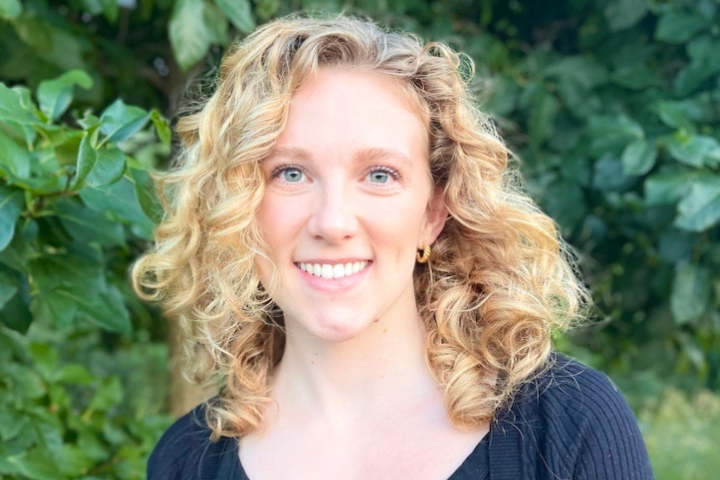Benefits for all: For this product designer, volunteering to help New Yorkers in need is a personal and professional perk
August 6, 2024 | By Dianna DellingNo one likes a clunky website. Struggling to find the right links and information is annoying when you’re shopping or reading the news. But for people relying on the internet to obtain public assistance or other services, web design can be either a roadblock or an accelerator to putting food on the table or keeping a roof over their heads.
“Something as minor as changing where a button is can help people get the cash assistance they need before they are evicted,” says Alice Halter.
Halter should know. As a senior specialist in product design for Mastercard’s cybersecurity organization, her job is to create interfaces that make it as easy as possible for businesses to stave off attacks.
And for the past few months, she’s been donating that same expertise to help the City of New York improve user experiences on Access HRA, the digital Human Resources Administration portal through which millions of residents apply for food stamps, Medicaid, home energy assistance and other public benefits.
She connected to this project through Unlocked, Mastercard’s AI-fueled career development platform, which features short-term projects, mentoring opportunities and customized learning for employees. Launched in 2021, Unlocked is intended to accelerate career growth, and an internal analysis showed that 33% of active participants experienced career moves, including promotions, within a year.

In fact, Halter signed up the moment Mastercard and Mayor Eric Adams announced in March that Unlocked would include volunteer opportunities at city agencies throughout the five boroughs, with employees matched to projects through their profile of skills and interests. The projects are part of an innovative public-private partnership with the city’s office of service and volunteerism, NYC Service.
The expansion of Unlocked reflects a surge in corporate volunteerism as companies look for ways to engage employees in a post-pandemic world, and workers say a sense of purpose is important to their overall job satisfaction and well-being. One recent survey of Gen Z and millennials revealed that an organization’s community engagement and social impact is an important factor in their job search.
“New York City is an epicenter of innovation — and inspiration,” says Michael Fraccaro, Mastercard’s chief people officer. “This partnership builds on our strong culture of purpose, creating an opportunity for our employees to harness the expertise and passion they’ve honed here at Mastercard to make a positive impact in our community.”
The idea of directly helping New Yorkers resonated with Halter. “I want to live in a city where everyone is doing well,” she says.
Halter became a New Yorker herself in 2017. A native of Albuquerque, New Mexico, she had just graduated with a degree in biology from Emory University in Atlanta, but she ditched plans for medical school to start her own contemporary dance company. Alice Liddell & Dancers performed throughout the tri-state area until 2020, when the pandemic shut down stages all across the country. So Halter made another career pivot, combining her creative and analytic leanings to pursue a career in user experience design — in layperson’s terms, the art of navigating a website or digital platform with ease and delight.
As a volunteer with New York City’s Department of Social Services, which supports more than 2 million people and administers the largest Supplemental Nutrition Assistance and cash assistance programs in the country, Halter faced a new but considerable mission: Make sure the portal is accessible and welcoming to people throughout one of the most diverse cities in the world.
“Everyone has to be able to use this platform, whether they have just learned how to use a computer, don’t speak English or have an auditory processing or visual impairment,” she says. “Ease of use can determine whether or not someone gets benefits that they not only need but have a right to.”
So, just as she does at Mastercard, Halter begins with a deep dive into the ways people will be interacting with the site. She reviews analytics and interviews users of all ages and backgrounds while looking for pain points: any part of their online interaction that’s confusing or takes longer than expected. Once the research is complete, Halter analyzes it and recommends changes that can improve the online journey.
She brings to the city a philosophy that also guides her full-time work. “How do we find a solution that ultimately meets our goals and fulfills our users’ needs?” she asks. “That’s the sweet spot for what makes a good product.”
This type of volunteer work also hits a sweet spot for her personally. Volunteering has always been a part of life for Halter, who spent two summers in the Dominican Republic as a Spanish and English literacy teacher. In fact, this year she has already used two of the five paid volunteer days Mastercard offers annually to distribute meals to city residents. But the Unlocked project is structured so that Halter can work on it during business hours, after completing her regular duties, a sacrifice of time she gladly welcomes.
“One thing that has come much to the forefront in my life over the past few years is the importance of community, and what it means to participate in it in a very human way,” Halter says. Unlocked, she says, “has reinvigorated my love of volunteering.”